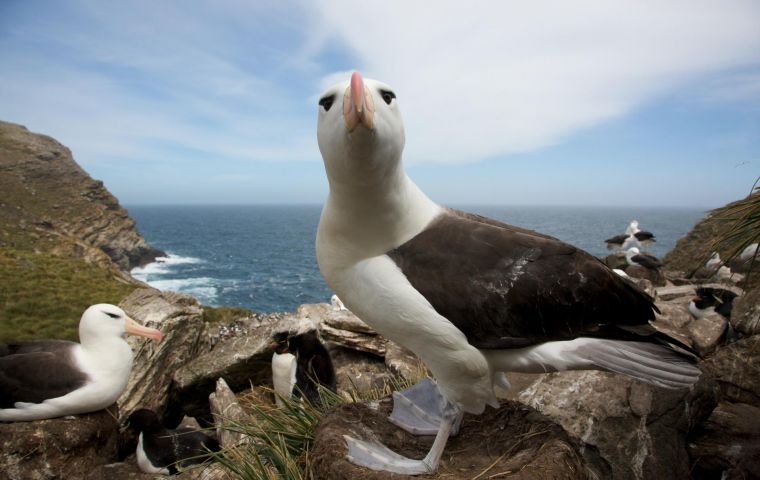MercoPress. South Atlantic News Agency
Researcher study of seabird ecosystem shift in the Falklands
 To understand how Falklands' seabirds might cope in a warmer climate, scientists set out to study the history of climate change and ecological changes on Islands
To understand how Falklands' seabirds might cope in a warmer climate, scientists set out to study the history of climate change and ecological changes on Islands Roughly 5,000 years ago, seabirds colonized the Falkland Islands in record numbers. The new research – published in the journal Science Advances – suggests the seabirds arrived around the same time that the South Atlantic cooled, and their arrival shifted the ecosystems on the Falkland Islands.
Today, the remote South Atlantic islands remain a refuge for several important seabird species, including great shearwaters, black-browed albatrosses, white-chinned petrels and five species of penguins.
For a few thousand years, these burrowing and ground nesting seabirds had the Islands mostly to themselves, but over the last few centuries, the birds have lost ground to sheep grazing and erosion. In addition, sea and air temperatures in the South Atlantic have been steadily rising as a result of climate change.
To better understand how Falkland Islands' seabirds might cope in a warmer climate, scientists set out to study the history of climate change and ecological changes on the Falkland Islands.
By sampling peat core layers, researchers were able to reconstruct a 14,000-year record of climate and ecological shifts on the Islands. The data confirmed that seabirds began migrating to the Islands in large numbers around the time the South Atlantic began to cool.
“Our 14,000-year record shows that seabirds established at Surf Bay during cooler climates,” lead study author Dulcinea Groff said in a news release.
“Seabird conservation efforts in the South Atlantic should be prepared for these species to move to new breeding grounds in a warmer world, and those locations may not be protected,” said Groff, who led the research while she was a doctoral student in ecology and environmental sciences at the University of Maine.
The peat layers also revealed a dramatic ecological transformation following the arrival of seabirds. Marine-derived nutrients from guano rejuvenated the island's poor soil, allowing the establishment of tussock grasses, or bunch grasses. Ash in the peat layers showed the proliferation of grasslands across the Islands led to an increase in seasonal wildfires.
Researchers suggest their work is a reminder of the important connections between disparate ecosystems, as well as an example of how quickly ecosystems can be transformed.
“Our study is unique because it documents a direct linkage across ocean and land ecosystems between top predators of the oceans -- the seabirds -- and Islands' plant communities,” said Groff, now a postdoctoral researcher at the University of Wyoming. “The abrupt ecosystem shift happened within a matter of a few decades and suggests that as the climate continues to warm, it's critical to think about where seabirds will go in the future and plan to protect those places.”
It's not just rising temperatures that conservationists are worried about, she said.
Grasslands on the Falkland Islands have been degraded by a couple centuries of livestock grazing. The Islands' wildlife species depend on the health of the grasslands. And because the Island's tussock grass depend on bird droppings, a decline in the abundance of seabirds could have broad ecological repercussions.
“As the climate warms, seabirds may find and occupy more suitable environments elsewhere, and we should expect that the coastal grasslands will respond to the loss in nutrients from seabird guano,” said Groff. (by Brooks Hays - UPI)




Top Comments
Disclaimer & comment rulesCommenting for this story is now closed.
If you have a Facebook account, become a fan and comment on our Facebook Page!